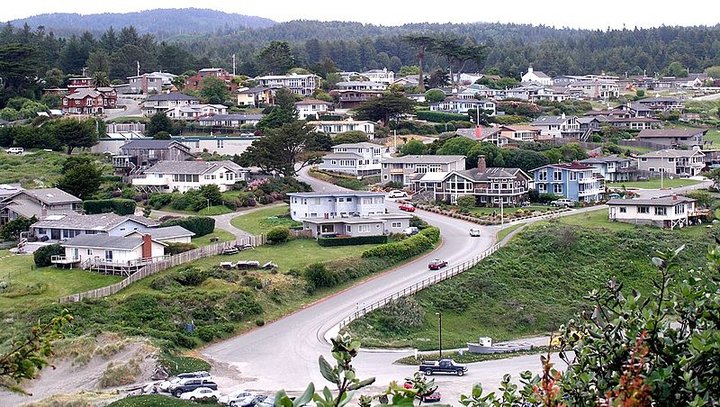UPDATE, Jan. 27:
The Trinidad City Council voted 3-2, opting not to participate in the feasibility study from the Humboldt Bay Municipal Water District.
Councilmember Tom Davies made the motion not to pursue the pipeline option, earning support from Councilmember Jack West and Mayor Steve Ladwig while Councilmembers Richard Clompus and Dave Grover voted in favor of the pipeline study, according to Ted Pease, a member of the Humboldt Alliance for Responsible Planning (HARP).
The majority of public comment was opposed to the pipeline.
###
Original post:

Trinidad. | Photo by Coolcaesar, via Wikipedia. Creative Commons license.
PREVIOUSLY:
- Coastal Commission Gives Green Light to 100-Room Hotel on Trinidad Rancheria … as Long as the Tribe Can Find a Reliable Water Supply
- The City of Trinidad and the Trinidad Rancheria Are at Odds Again Over the Water Supply for the Tribe’s Hotel Project
- City Pumps Brakes on Trinidad Rancheria’s Request for Water; Will Draft Policy Before Continuing Formal Negotiations Over New Hotel Development
- Trinidad Rancheria Asks for Pipeline Extension to Get Water Via Humboldt Bay Municipal Water District
###
The Trinidad City Council on Tuesday will consider whether to participate in a feasibility study for a project that would bring a steady flow of water to the city from the Mad River via a new pipeline.
The Humboldt Bay Municipal Water District (HBMWD), which supplies water to Eureka, Arcata, McKinleyville, Blue Lake and other area communities, is in the early stages of researching the possibility of expanding its service area north via a waterline extension at least as far north as the Trinidad Rancheria, where tribal leaders have been searching for a reliable water source to supply a proposed five-story, 100-room hotel near Cher-Ae Heights Casino.
Trinidad’s water is currently supplied by Luffenholtz Creek, which rises and falls fairly dramatically with seasonal rainfall. During recent drought years, it has fallen to particularly low levels. City leaders, conducting long-range water planning, have identified the HBMWD as a possible source of “water resilience.”
However, some area residents, including Fifth District Supervisor Steve Madrone, are vehemently opposed to the pipeline proposal because they believe it could pave the way for future development that could spoil the region’s rural charm, and in recent days they’ve been sending letters to the Trinidad City Council urging it to shun the proposal.
In a letter sent dated Monday, for example, Edward C. Pease, who lives northeast of city limits, says, “Once unlimited (untreated) water is available, forested hillsides from Moonstone to Big Lagoon that are now unsuited for development suddenly become prime building lots, and the area will be prime for a development boom. Such development would destroy the Trinidad area, and make us just another bustling California coastal town.”
A group of activists aligned under the banner of the Humboldt Alliance for Responsible Planning (HARP) has steadfastly fought against the proposed hotel on Trinidad Rancheria property, and now they’re speaking out against the pipeline.
One member of that group, Trinidad area resident Jane Williams, began her letter to the council in all caps:
“I AM UNEQUIVOCALLY AND PERPETUALLY AGAINST UNLIMITED GROWTH NORTH OF LITTLE RIVER!” it reads. “I am asking the city council to not EVER get involved with bringing water in pipelines north of Little River.”
Madrone, in his own letter to the council and community, says that while all locals are concerned about water resiliency for the greater Trinidad area, the best solution would be to focus on increasing rainwater collection and hard tank storage. The pipeline, by contrast, would induce growth, he argues.
“Increased growth means increased crowds in town and at beaches and on trails,” his letter states. “Imagine the kinds of crowds we saw this summer being here all year long and even bigger in the summer. Our community is at a critical juncture in deciding what kind of community we want in the future.”
Reached by phone on Monday, Trinidad City Clerk Gabriel Adams said these pleas are misplaced. The council, he said, isn’t considering the pipeline project per se; it’s merely considering whether to participate in the feasibility study upon which HBMWD has already embarked.
“This is merely a fact-finding mission,” Adams said. “This is just [asking], ‘Hey, do you want more information?’”
The staff report on this matter takes an even stronger tone.
“The concern of rampant development is not realistic, especially for the City of Trinidad,” it says. “The City is only a square mile and has very few undeveloped parcels. On top of that, a City has control over its own development and can limit future development through zoning and planning.”
The report also brings raises the prospect of worsening droughts due to climate change.
“We can’t leave ourselves high and dry,” it states.
Opponents to the pipeline, of course, are concerned about growth beyond Trinidad city limits, including in and around Westhaven, Moonstone Beach and north to Big Lagoon. But Adams said the lack of public sewage service to the region restricts growth.
“There will always be that thumb on development,” he said.
In a December 4 letter to the Trinidad City Council, HBMWD General Manager John Friedenbach said now is the time for the city to get involved if it wants to have a say in how big the proposed pipeline might be — and thus how many customers it could potentially serve.
“If a potential waterline to the Rancheria is sized only for their consumption needs, the possibility of a further extension to the City of Trinidad will be very unlikely and will cost considerably more,” Friedenbach’s letter states.
Of course, “very unlikely” is exactly how some area residents hope to keep this proposal.
The Trinidad City Council meeting, which will be held remotely via Webex, is scheduled to begin at 6 p.m. To participate, you can join the meeting from a link on the city’s website.
CLICK TO MANAGE